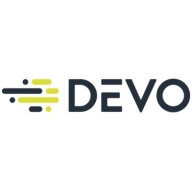

Devo and Cribl are notable players in the data analytics and management category. Devo seems to have an edge with its high-speed search and multi-tenant architecture, while Cribl excels in real-time data transformation capabilities.
Features: Devo's significant features include its Activeboards for complex data queries, a modular design for building customizable dashboards, and a cloud-native architecture that manages 400 days of hot data. Cribl offers real-time data transformation within the pipeline, seamless log collection, and versatile data routing capabilities, making it highly beneficial for user experience enhancement.
Room for Improvement: Devo could enhance its browser-based features and Activeboards' visual analytics for better feature maturity. Challenges with the GUI and multi-tenancy setup suggest a need for improved monitoring applications and pricing transparency. Cribl needs to better its documentation, especially in configuration and output understanding, while focusing on backward compatibility and improving logging and debugging features.
Ease of Deployment and Customer Service: Devo provides flexible deployment options across clouds and on-premises, backed by a good onboarding experience, although there are mixed reviews regarding technical support responsiveness. Cribl also offers a versatile deployment model with generally praised professional services, though it too faces occasional customer support responsiveness issues.
Pricing and ROI: Devo's pricing is based on data ingestion, sometimes leading to unexpected costs due to additional metadata charges, yet it remains cost-competitive with substantial data retention features. Cribl offers a more accessible pricing model, regarded as fair and cost-effective, especially compared to tools like Splunk, contributing positively to ROI for both.


Cribl optimizes log collection, data processing, and migration to Splunk Cloud, ensuring efficient data ingestion and management for improved operational efficiency.
Cribl offers seamless log collection directly from cloud sources, allowing users to visually extract necessary data and replay specific events for in-depth analysis. It provides robust management of events, parsing, and enrichment of data, along with effective log size reduction. Cribl is particularly beneficial for migrating enterprise logs, optimizing usage, and reducing costs while streamlining the transition between different log management tools.
What are Cribl's most important features?
What benefits and ROI should users look for?
Cribl is widely implemented in industries requiring extensive data management, such as technology and finance. Users leverage Cribl to handle log collection, processing, and migration efficiently, ensuring smooth operation and effective data analysis. It aids in managing temporary data storage during downtimes and better handling historical data, preventing data loss and allowing extended periods for viewing statistics and monitoring trends.
Devo is the only cloud-native logging and security analytics platform that releases the full potential of all your data to empower bold, confident action when it matters most. Only the Devo platform delivers the powerful combination of real-time visibility, high-performance analytics, scalability, multitenancy, and low TCO crucial for monitoring and securing business operations as enterprises accelerate their shift to the cloud.
We monitor all Log Management reviews to prevent fraudulent reviews and keep review quality high. We do not post reviews by company employees or direct competitors. We validate each review for authenticity via cross-reference with LinkedIn, and personal follow-up with the reviewer when necessary.